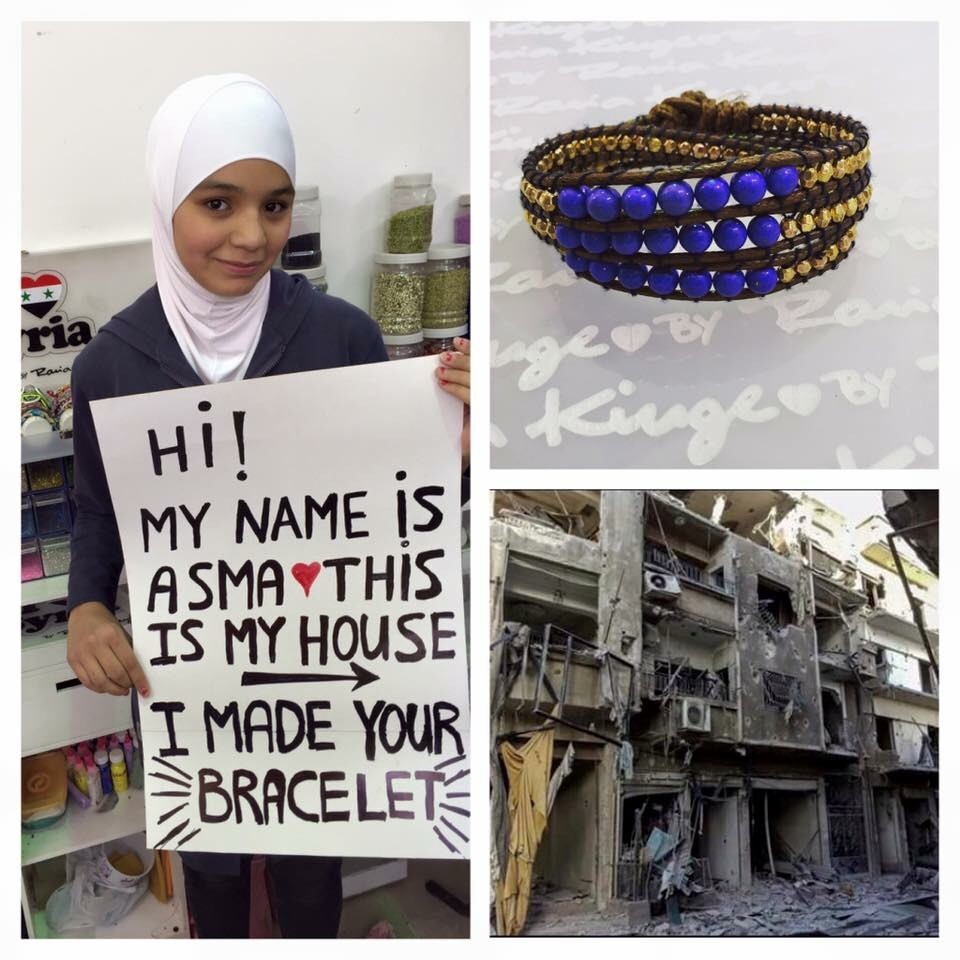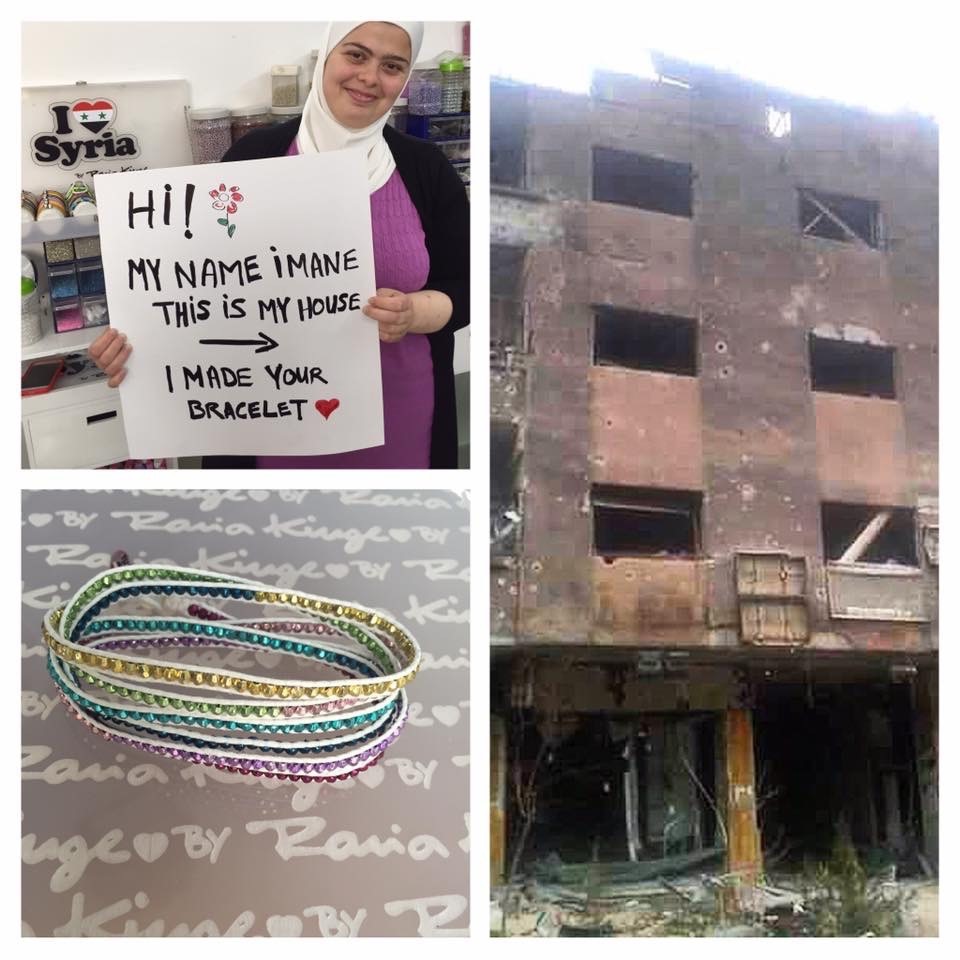For millennia, Damascus enjoyed a reputation for fine, artisanal craftsmanship. Its souqs have always been a treasure trove of unique goods, from wooden furniture delicately inlaid with mother of pearl, gold jewellery hammered into intricate designs or soap from Aleppo, made from its famous olive oil.
But ever since the war broke out in 2011, the market for fineries has been in decline, replaced by the need for food and shelter.
According to the UN, more than 6.5 million Syrians are now internally displaced while some 3 million have fled the country altogether, among them artisans, taking with them their expertise and knowledge of their crafts.
Rania Kinge could have left Syria when war broke out. The journey would have been an easy one for the Swiss national, but she stayed in the country of her birth where she worked as a jewellery designer and artist. She was by no means, however, immune to the chaos and destruction that had spread over Syria.

While working on the Damascus Concept collection for her jewellery line in 2013, Rania visited some of the internally displaced people (IDP) in the shelters run by local non-governmental organisations (NGO). She realised she could create a viable income for the women in the shelters by establishing a social enterprise that produced and sold jewellery and handicrafts.
“I could teach them how to make jewellery and create a brand entirely made by displaced people,” she says. “This would alleviate the burden of having lost an entire home and also reinstate them into society.”
The Damascus Concept developed into a skills-training platform focusing on the revival of Syria’s heritage of design and craftsmanship. The first brand to emerge from it was I Love Syria, a social enterprise selling handmade bracelets.
With help from the NGOs, Rania was introduced to several women interested in making handicrafts and jewellery and trained them in her own living room. The women began with making beaded bracelets with small motifs of the Syrian flag.
“We faced quite a load of obstacles, ranging from the war situation to lack of electricity, of water, rockets, social structures, political structure, corruption, religious ideology…you name it,” says Rania.
She funded the entire project herself and took care of the sales, marketing, accounting and designing operations too.

Through social media, Rania was able to reach all corners of the globe. The first time she posted a picture of the bracelets the women in her workshop had made onto Facebook, it led to an order of 15,000 bracelets.
The bracelets were transported out of Syria and into Europe with the help of the International Trade Centre (ITC), a development agency dedicated to supporting the internationalisation of small to medium-sized enterprises around the world.
I Love Syria now had customers all around the world and the orders kept growing, enabling Rania to move operations out of her living room and rent an office and then a second one in the Old Damascus Souq.
From there, Rania developed more products for Damascus Concept, including crochet bags and tunics imprinted with Arabic calligraphy.
Some of the products have been featured as must have items in fashion magazines while most recently, one of the crochet bags was featured in a luxury fashion show in Marbella, Spain. The Swarovski company is also getting on board by providing mentorship for production and sending some of their stones and beads to be used in the bracelets.
ITC also helped I Love Syria and Damascus Concept set up pop-up stores in Geneva to give potential customers a more interactive experience with the products, which then helped generate more online sales.
Today, Rania has opened a permanent store in Geneva where all the products are exhibited.
She pays the women a monthly wage of $250, in line with the average salary in Syria. This income has enabled them to leave the shelters and rent their own homes.
By empowering women to sustain themselves and their families through work, it provides their children with a relatively normal life “so they don’t grow in violence and poverty and later become violent”, says Rania. “Empowering women generates peace.”
According to ITC, women need just one eighth of the start up costs that men do and still generate 12 per cent more revenue.
What initially started out as 20 women, has grown to more than 100 from across all parts and backgrounds in Syria. The majority have little formal education, with one who was unable to read or write. I Love Syria and Damascus Concept have proven to be a lifeline for such women who have become the sole earners for their families. Many of the original recruits are now training more IDPs and imparting their recently acquired jewellery-making skills to others.
This has enabled I Love Syria to branch out to Lattakia where they now have a workshop employing 80 women. The team from Damascus would drive 400km every week to Lattakia to train the group of mostly Christian women who had fled the Islamic State of Iraq and Syria (ISIS).
Rania is hoping to reach 1000 women who have been displaced by war over the next couple of years.
In the meantime, she is working with the government of Japan to empower 20 women and 15 artisans in Damascus this month with the project governed by the ITC. “It will help get a power generator to produce electricity [and] rent a bigger space,” says Rania. “The displaced girls that I have trained will become certified United Nations trainers during the project and will train other IDPs.”
This will enable the certified women to earn four times the income they currently receive.
“They are transitioning from IDPs to empowered UN trainers. Usually UN jobs are reserved for the elite in Syria,” says Rania.
The project will yield a team trained in e-commerce, which will also help other entrepreneurs in Syria to export their products to international markets.
“This is a big step for displaced women of the war, and social entrepreneurship as a whole,” says Rania. “Especially since an all-women social enterprise was non existent in Syria, a country where some men don't shake your hand because you are a woman.”
